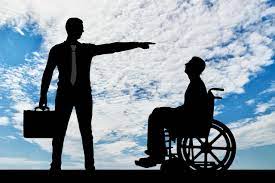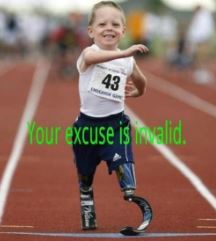Social Issues Faced by People with Disabilities
Discrimination, Ableism, Accommodations and Accessibilty, Microaggressions, Inspiration Porn, and stereotyping
 Though the ADA has made it illegal to discriminate on the basis of disability, many disabled individuals face discrimination often in everyday life. Many business and able-bodied individuals hold prejudiced attitudes and exhibit discriminatory behaviors toward disabled individuals. Ableism is an example of these discriminations. According to Eisenmenger (2019), ableism is
Though the ADA has made it illegal to discriminate on the basis of disability, many disabled individuals face discrimination often in everyday life. Many business and able-bodied individuals hold prejudiced attitudes and exhibit discriminatory behaviors toward disabled individuals. Ableism is an example of these discriminations. According to Eisenmenger (2019), ableism is the discrimination of and social prejudice against people with disabilities based on the belief that typical abilities are superior.
 Ableism comes in many forms, including failure to comply with ADA laws, failure to make appropriate accommodations, segregation of disabled children in separate schools, etc. Ableism often comes in the form of lacking proper accommodations and accessibility, which are significant social issues faced by people with disabilities. Lack of accessibility not only makes it more difficult for disabled individuals to do everyday things like grocery shop, attend movies, or vote, but it's also dehumanizing and embarrassing for them. Failure to make proper accommodations or to create accessible spaces sends the message to people with disabilities that it's their job to accommodate businesses, not the business' job to accommodate them. Though we most often see lack of accessibility in terms of physical barriers like the ones discussed above, it also includes failure to provide adequate health care, insurance, and even mental health resources. These, combined with physical barriers, create social injustices for people with disabilities.
Ableism comes in many forms, including failure to comply with ADA laws, failure to make appropriate accommodations, segregation of disabled children in separate schools, etc. Ableism often comes in the form of lacking proper accommodations and accessibility, which are significant social issues faced by people with disabilities. Lack of accessibility not only makes it more difficult for disabled individuals to do everyday things like grocery shop, attend movies, or vote, but it's also dehumanizing and embarrassing for them. Failure to make proper accommodations or to create accessible spaces sends the message to people with disabilities that it's their job to accommodate businesses, not the business' job to accommodate them. Though we most often see lack of accessibility in terms of physical barriers like the ones discussed above, it also includes failure to provide adequate health care, insurance, and even mental health resources. These, combined with physical barriers, create social injustices for people with disabilities.
 We can see an example of ableism at play in Hannah's story. Hannah was diagnosed with Streptococcus as an infant, and was given strong antibiotics to save her life. As a child, Hannah struggled in school with paying attention and being disruptive in class, and after a hearing test, it was discovered that those life saving antibiotics had had long term effects on Hannah's hearing. In her story, Hannah recalls experiencing a lot of ableism in college. She recalls not being able to understand videos because they often did not include transcripts or captions, and she was often handed illegible notes from professors when she asked for accommodations for lectures. Hannah discusses how people's attitudes toward her and her disability made her feel at times that her hearing loss wasn't a big deal. She also explains that having a disability can be challenging, but not because of the obstacles that arise from the disability itself, but because of the way people react to and treat her because of her disability (Rutnam, 2018) Hannah is pictured below.
We can see an example of ableism at play in Hannah's story. Hannah was diagnosed with Streptococcus as an infant, and was given strong antibiotics to save her life. As a child, Hannah struggled in school with paying attention and being disruptive in class, and after a hearing test, it was discovered that those life saving antibiotics had had long term effects on Hannah's hearing. In her story, Hannah recalls experiencing a lot of ableism in college. She recalls not being able to understand videos because they often did not include transcripts or captions, and she was often handed illegible notes from professors when she asked for accommodations for lectures. Hannah discusses how people's attitudes toward her and her disability made her feel at times that her hearing loss wasn't a big deal. She also explains that having a disability can be challenging, but not because of the obstacles that arise from the disability itself, but because of the way people react to and treat her because of her disability (Rutnam, 2018) Hannah is pictured below.
 Microaggressions are another social issue that many people with disabilities face in day-to-day life. Microaggressions are verbal or behaviors that are either consciously or unconsciously insulting on the basis of race, gender, or disability (Eisenmenger, 2019) These aggressions are often communicated through insensitive comments such as
Microaggressions are another social issue that many people with disabilities face in day-to-day life. Microaggressions are verbal or behaviors that are either consciously or unconsciously insulting on the basis of race, gender, or disability (Eisenmenger, 2019) These aggressions are often communicated through insensitive comments such as that's retarded
, what happened to you?
, I'm so OCD about my stuff
, and so on. Microaggression also includes treating people with disabilities as being helpless and offering assistance with everyday tasks to fulfill one's good deed
for the day. Another example of microaggression is what's known as inspiration porn
. Comedian and Journalist Stella Young defines inspiration porn as objectifying people with disabilities for the benefit of able-bodied people (Young, 2014). People often associate people with disabilities with inspiration. For example, an able-bodied individual may approach an individual in a wheelchair at the grocery store and say Wow, you are such an inspiration for getting out of bed and coming to the store
. Though comments like these are often made with good intentions, they objectify people with disabilities in order to encourage and motivate able-bodied individuals, enforcing beliefs such as no matter how bad things are, at least you don't have to live like that
. Inspiration porn is perpetuated through social media, where images of people with disabilities are often paired with messages such as never give up
or When things seem impossible, try harder
.

